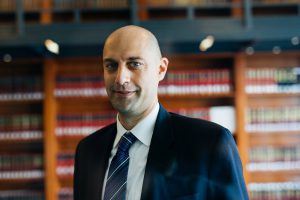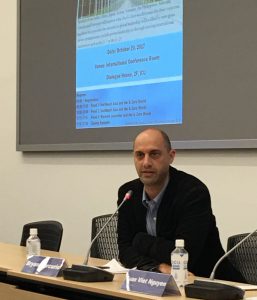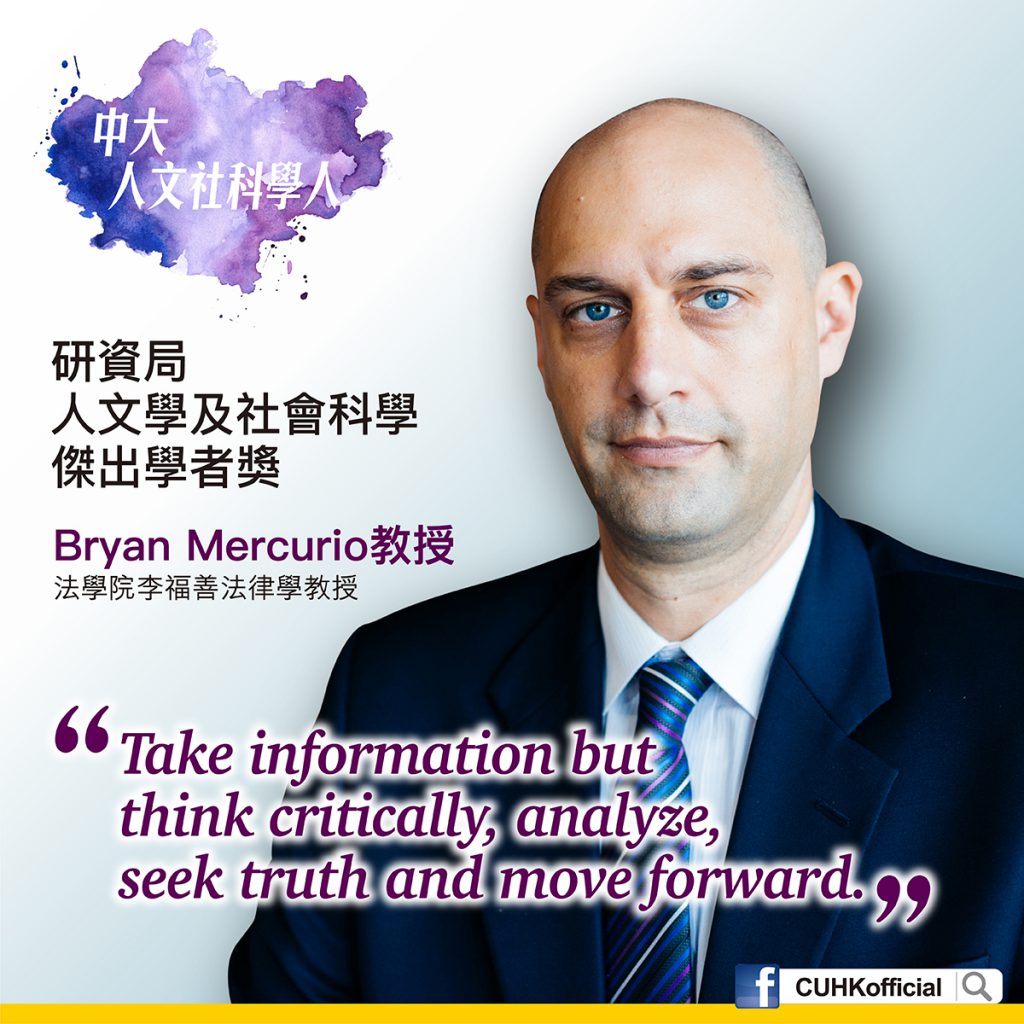Professor Bryan Mercurio Sees Dynamics in US-China Trade War from a Wider Perspective
Professor Bryan Mercurio Sees Dynamics in US-China Trade War from a Wider Perspective
“Take information but think critically, analyze, seek truth and move forward.” With this motto in his heart, Professor Bryan Mercurio, Simon F.S. Li Professor of Law at CUHK received the 2020 Humanities and Social Sciences Prestigious Fellowship from the Research Grants Council (RGC) in recognition of excellent achievement in his research area.
Professor Mercurio is a world renowned scholar, specialising in international economic law (IEL). While his work covers many areas of IEL, including free trade agreements, trade in services, dispute settlement and, increasingly, international investment law, Professor Mercurio’s most well known as a leading expert in the intersection between trade law and intellectual property rights.
Fascination of Law
Professor Mercurio started his academic path in law when he was an undergraduate student. “I became interested in IEL because it is not just law in the narrow sense. IEL is based on government to government networks. That’s about treaties, with governments establishing norms and regulations to allow trade and investment to flourish. IEL is the interplay and relationship between law, politics and economics. When studying or practicing in the area it is necessary to take a wider perspective.”
He considers that people need to know the reason why government agree to certain rules, or to liberate trade and allow market access to goods from other countries. That is the law putting into force the political will and economics behind it. “That kind of interplay is always changing and it is a dynamic area of the law. That’s why I found it fascinating,” he said.

Professor Mercurio specialises in international economic law.
New Page in Hong Kong
Prior to relocating to Hong Kong in 2007, Professor Mercurio taught in the faculty of law at the University of New South Wales (UNSW) in Sydney. It was also the place where Professor Mercurio met Professor Mike McConville, the Founding Dean of CUHK Law School. “Professor McConville offered an exciting opportunity at that time. The Law School of CUHK had only been established for a few years. Professor McConville visited Sydney while I was working and living there. He sold me on the vision of helping to establish a new law school. It was an exciting time as lots of hard work had to be done. However, all of this was more rewarding than only doing research and teaching,” Professor Mercurio recalled. “I was welcomed by the existing networks in the Asian region and have built links with scholars and governments that helped my research and reputation.”
When Professor Christopher Gane became the second Dean of the CUHK Law School, Professor Mercurio worked closely with him by serving as Associate Dean of Research. “We broke into the top 50 law schools worldwide in the QS Global University Rankings. Nurturing research talents and finding ways to provide opportunities for young people has made the Law School become successful now. Helping him to build the reputation of CUHK Law School is the most memorable experience in Hong Kong,” he said.
Future of Global Trade Regime
The awarded project entitled “Reshaping global trade: The impact and effects of the US-China trade war” seeks to provide leading analysis of issues in the US-China trade war, multilateral trade systems and the future of the global trade regime to understand the driving force for the trade war and its impact on the global economy. Professor Mercurio would like to analyse not only the influences of those two countries, but also the effect on third countries.
“The starting point of the trade war was a very important and volatile time for trade. Rules set by the multilateral system such as the World Trade Organization (WTO) are not progressing. They have been unable to operate as effectively as they should for the 10 years that this problem has existed.” he said. “The aim of this project is to take a holistic view and frame the trade war in the perspective of economic statecraft. I am trying to look at trade as part of the geopolitical context between US and China. Trade is a big part of the strategic confrontation between the two countries.”
From such chaos, Professor Mercurio would like to see what order will emerge. His plan is to visit six countries and conduct field work, though the pandemic has delayed his travel plan. “The biggest threat is the challenge to the whole multilateral rule-based system. That international order has been established since the World War II. It was the system of rules involving most trading nations coming out of chaos; the first time ever,” said the professor.
From his point of view, this trade war and the friction between US and China will continue, even with the new president Joe Biden and the Democratic Party fully on board. That leads to risks to the rule system which will affect many countries and millions of people. “If the big players do not adhere to the rules or respect the obligation they agreed to, it will lessen the legitimacy and strength of the institution, i.e. WTO in this case. This will hurt countries as well as traders. My thesis now is that eventually we will come back to the system… Let’s take the WTO as a foundation of a building. On top of that, people will put other materials such as regional or bilateral free trade agreements,” he explained. “I think that we will see more and more of this. It will lessen the dominance of the WTO system in some way, but having that framework is still important. The system will be still in there but have slow progress in the foreseeable future.”
Passion and Mission
Working in academia over 15 years, Professor Mercurio suggests people who want to stay in this field must have a clear objective. “That means having the aim to achieve something and to have impact. Following your passion is also important. If you are not passionate about your research topic, just drop it and pick another one. Don’t do research simply because it is trendy, popular or you think it will get you a promotion. If you don’t enjoy the research topic, you probably cannot produce your best work. We are here to help shape the mind of the young generation. It is an important mission so we should treat it as a gift.”

Professor Mercurio suggests people who want to stay in this field must have a clear objective.
Referring to his motto, Professor Mercurio reckoned that he was inspired by the New York Times bestselling author Brandon Sanderson, who wrote “The Way of Kings”. He quoted from this author, “If we are not thinking and drawing conclusions, we might just leave the knowledge in the text.” Professor Mercurio believed, “…the most important value for us as a scholar or student or individual and productive member of society is not only taking information uncritically, but also analyzing it critically.”





